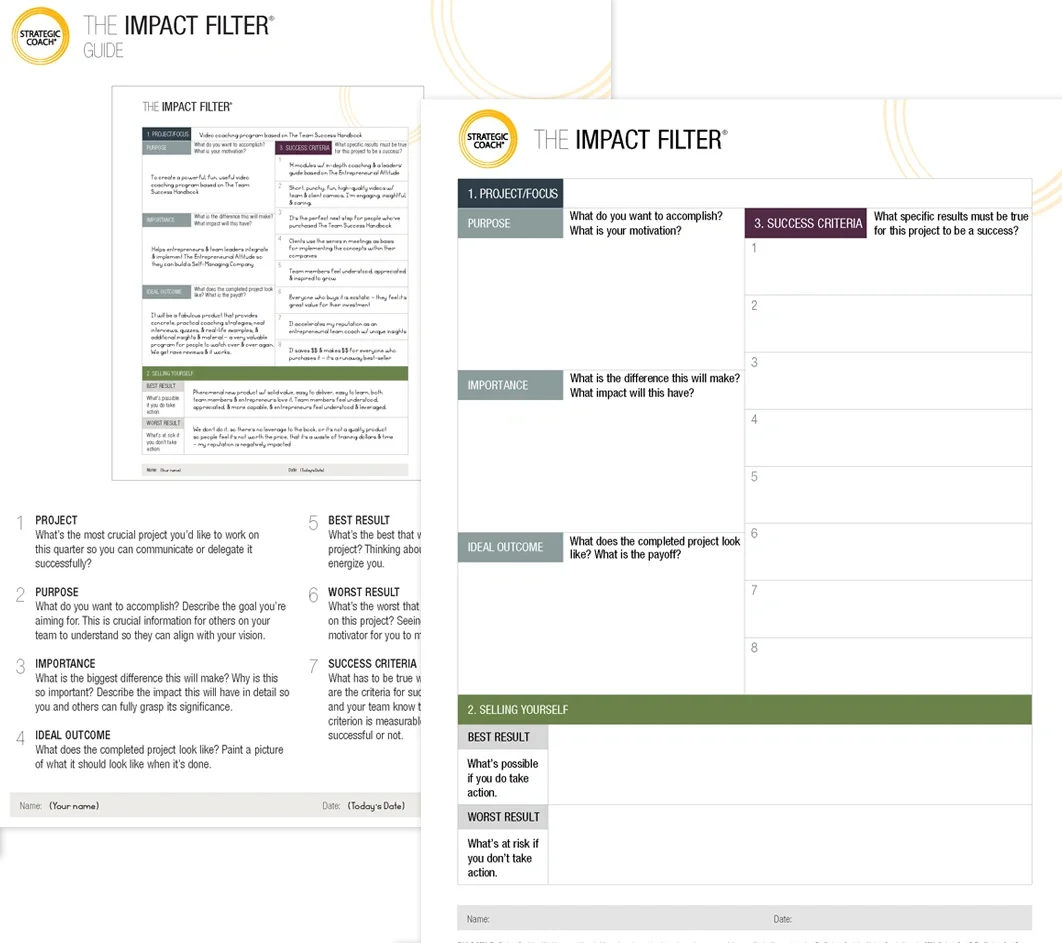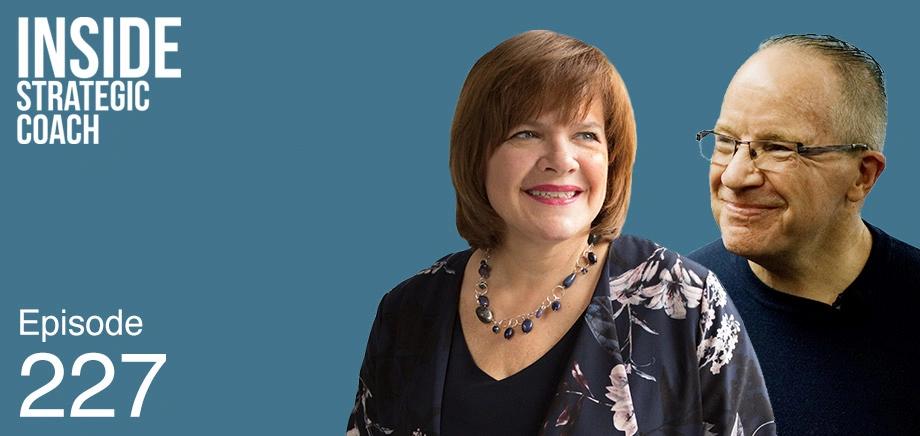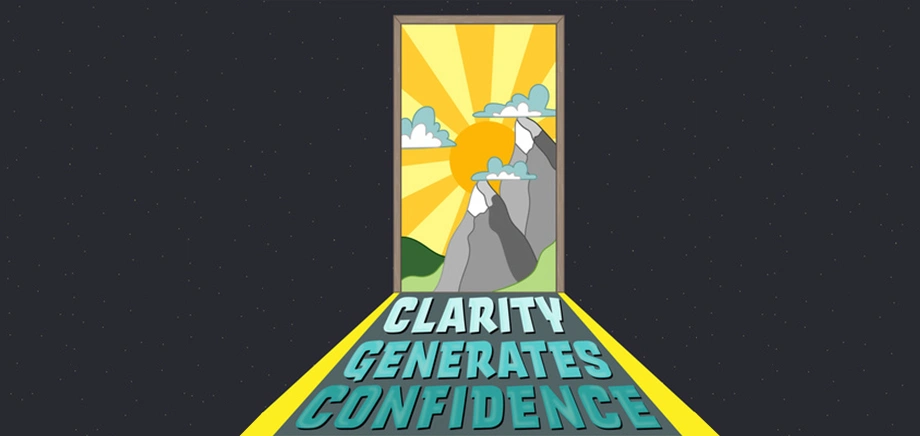Growing Great Leadership
April 15, 2025
Hosted By
 Dan Sullivan
Dan Sullivan
 Shannon Waller
Shannon Waller
What if leadership isn’t about titles, but about creating new capabilities others can observe? In this episode, Dan Sullivan and Shannon Waller break down the shift from bureaucratic management to self-leadership in the networked economy. Learn the four-step process to transform uncertainty into confidence—and why focusing on problems is the death of innovation.
Here’s some of what you’ll learn in this episode:
- The four-step process that always makes you an inspiring leader.
- Why a goal isn’t a destination.
- The big difference between a role and a job.
- Why there are no orders in the network economy.
- How Dan is finally revealing his process in a new book.
- Why unique skills are generally wasted in bureaucracies.
Show Notes:
Self-leadership starts with creating new capabilities—not waiting for permission.
Anytime you’re doing something that creates a new capability, and other people observe you doing that, that's leadership.
Your activity of creating a new capability gives others the confidence that they too can have the courage to create a new capability.
The pandemic created a network economy.
Great technologies like Zoom have enabled people to work remotely.
Many management activities within a company can now be handled by apps.
Bureaucracies punish boundary-crossing, while networked teams reward it.
When people get possessive about their territory, it shuts down creativity.
Instead of trying to fix problems (or worse, just complaining about them), create solutions that make problems irrelevant.
Confidence comes after courage—not the other way around.
Resources:
Growing Great Leadership by Dan Sullivan
The Self-Managing Company by Dan Sullivan
The Team Success Handbook by Shannon Waller
Who Not How by Dan Sullivan and Dr. Benjamin Hardy
The 4 C’s Formula by Dan Sullivan
Episode Transcript
Shannon Waller: Hi, Shannon Waller here, and welcome to Inside Strategic Coach with Dan Sullivan. Dan, in our last podcast, you gave a great overview of the shift in organizational structure from 1975 to 2025. And our latest book coming out now is called Growing Great Leadership, and you describe that process. And then you also talk about something you referenced in our last podcast called being self-leading, or self-leadership, which I think is such a fascinating idea. We talk about having a Self-Managing Company, we talk about having a Self-Multiplying Company, but there's something interesting that people, I think, can grow into, and that is actually how to become self-leading, which really, if you think about the type of network companies and organizations we're a part of, is actually a new capability and skill. So I want to do a deep dive into that today, because I find it absolutely fascinating. So what do you mean by someone being self-leading? What does that mean to you?
Dan Sullivan: First of all, that you've chosen to create a new capability, okay? And it can be in any part of your life. You know, it can be in your personal life or your business life. And that's the first part of it. So you are in the process of acquiring a new capability, creating a new capability, growing a new capability, whichever verb you want to use. First of all, there's your activity of doing that, and then the other aspect is that you're being observed by other people doing that. At any time you are doing something that creates a new capability, and other people observe you doing that, that's leadership.
Shannon Waller: Mm hmm. Okay, so creating a new capability and being observed, creating that new capability. So it's not just hiding away in a dark room, doing it on your own. It's actually where other people can observe that. And is that because people are really great at imitation and they get inspired by someone else? I mean, I don't mean imitating your creativity, but I mean, they're like, oh, if he or she is doing it, I can do it, too. Is that why that's important?
Dan Sullivan: Yeah, I think it inspires them to do that in their own life, whatever it may be. So your activity of creating a new capability gives them the confidence that they too can make a decision to create a new capability. I think what's unique about our book is that there's actually a four-step process that once you want to, you visualize a new capability, there's a four-step process for actually achieving the new capability, and that whether you think you're being a leader or not doesn't really matter. If you go through the four-step process, you will be a leader.
Shannon Waller: I think that's really powerful. And Dan, before we jump into what that four-step process is, why is it important in this new networked version of work of organizations? Why is that so key?
Dan Sullivan: Well, if it wasn't apparent that we were living in a networked work environment before COVID, we're certainly conscious of it. You know, I don't know what the percentages are, but there's a significant number of people who used to work, used to have to go to a physical space and be there. And, you know, it varies from company to company. But I would say that in every company, there's people who are operating remotely. And that's only possible because of the communication networks, great technologies like Zoom that we're using right now.
We wouldn't have been doing our podcast this way before COVID. But during COVID, we did a lot of work together. You and I did a lot of work together. And it was fun. It was productive. We could do a lot more of it. And it didn't require any time except the time of actually doing the recording. So there are great efficiencies in that. So that just happened either by choice or by necessity to millions of people. So after COVID, everything's the network economy. You know, there's lots of very large office buildings that are nearly empty today because the work of the company can be done without the building.
Shannon Waller: Very true. And so everyone can work remotely. We are connected electronically, which is amazing. Zoom's incredible. And as you've talked about in our previous podcast, when we talk about in our new book, you know, the fact is that the leaders used to be at the very, very, very tippy top.
Dan Sullivan: Just a few leaders.
Shannon Waller: Just a few, the very top, and the rest was management. One of the things that I found fascinating in the book is you say management is now handled by the technology, which is true. If you add project management software like Asana, like I brought into our marketing team and other structures, a lot of that day-to-day stuff that used to be the paper shuffling, I think, can now be handled by a ton of phenomenal apps that can help you do that. So we all can be leaders. So let's chat about that for a moment, because I think a lot of people even coming into companies, entrepreneurial or not, don't necessarily think of themselves in a leadership way.
Dan Sullivan: Yeah, well, here's the thing. I'm one of the two founders of the company, and I'm definitely in a leadership position in terms of everybody knows that Dan's the guy who creates the new stuff that feeds the workshop program, all the other coaches and Strategic Coach. I mean, this is very clear. It was clear in 1989, and it's clear in 2025. But Dan never actually told you before this, how I actually go through the process. I mean, even in a small company, it's kind of mysterious what people do in their various roles. Okay. First of all, they don't have roles. They have jobs.
Shannon Waller: Okay.
Dan Sullivan: And that's a distinct difference because a job was really created for the big pyramidal structures, factories, and then the office buildings were the management portion of the factory, whatever was being created. And yeah, that wasn't an old model that started middle of the 19th century when industrialization came in. But what I think our book does is that I, as the leader, am very conscious to reveal to you how I actually improve myself. I have a role in the Strategic Coach company. You have a role in the Strategic Coach company, and we each have a specialized area of expertise. We each have a specialized area of result that we're working, but everybody in the company is in a role. They have a specialized capability that they're producing a particular specialized result, and all the results together produce the, you know, why we get paid, you know, why the company prospers and why the company grows.
So there's no difference in our roles. There's difference in our jobs. But I mean, our roles are totally unique. So one thing is, if you take this approach, everybody in a company, we have 120. What we're saying is that every one of the 120 individuals, team members in our company, has the uniqueness of a different kind of role going forward, and they can continually grow this role just by acquiring new capabilities just related to what they do every day and what they can see coming in the next quarter, the next half year.
And so there's a commonality to our growth structures, which could not have taken place at all in the old buildings. If you go beyond your job borders, you're just causing trouble. But if you go beyond your role borders, it's good for everybody. So it's just the opposite effect. In a job, if you go beyond the borders, it causes chaos. In a role basis, if you go beyond your borders, it creates great creativity and productivity.
Shannon Waller: I love this, Dan, because it means that you can start …
Dan Sullivan: I love it, too. I hadn't thought about it before.
Shannon Waller: I thought it was a new thought. I like that. Because so much of people's awareness is, oh, I don't want to step on someone else's toes.
Dan Sullivan: That's my territory.
Shannon Waller: Right, people get very possessive.
Dan Sullivan: Oh yeah.
Shannon Waller: And it totally shuts down creativity.
Dan Sullivan: Yeah.
Shannon Waller: And then people also don't speak up. They don't focus on the end result. They're focused on their position and status, all the stuff I can't stand. So this is fascinating. Is there an example, Dan, of someone in their role does something extra and it's a good thing versus stepping on someone's toes? What might this look like?
Dan Sullivan: You.
Shannon Waller: I thought you might say that. Okay, so one of the things that came to mind is, and by the way, this is using you as a model, you were coaching in the workshops, you guys, okay, guys, write a book. This is what you were coaching. And I was like, okay, Dan says, write a book. So I wrote a book, The Team Success Handbook. And it was something that no one else would have created. And you're right, it didn't step on anyone else's toes. Is that an example?
Dan Sullivan: Yeah, well, that's not the only thing. You know, when you joined Coach back in 1991, we didn't hire you to do podcasts with Dan.
Shannon Waller: Excellent point. They didn't exist.
Dan Sullivan: There was no podcast, but you're here because of all the growth of role that you've done over the last 33, 34 years. So my sense is you can't take over someone else's territory when you're the one creating the territory.
Shannon Waller: Hmm. So it's not a zero sum game.
Dan Sullivan: No, it doesn't interfere with anyone's territory. It actually makes other people's territory more valuable. But that's not true in the bureaucratic pyramid. You go beyond your boundaries, you're actually interfering with workflow. And that's why it has to be so rigid, because you can't go beyond your territory. Which means that you have unique skills, but they can never develop except for the minimal part of it that actually operates within bureaucratic teamwork. Anyway, and leadership is only possible when you get to the very top of the pyramid. The rest of it's just management. You're not giving orders. And besides, in the network economy, there aren't orders. There's just new creative projects that add to the overall creativity, productivity, and profitability of the company.
Shannon Waller: Hmm. As I'm listening to you, I just like want to get to all the creative projects that I'm getting to. Like, it's very energizing hearing you talk, Dan.
Dan Sullivan: And the more you get to and achieve, you know, you have to achieve the projects. The more you achieve them, the better it is for everybody else. And the more they're inspired by what you're doing.
Shannon Waller: Okay, so before we get to the process, and I promise if you're listening, we will get there soon. Are there dynamics that you see, I know that I see them sometimes, where people shut down that creative process? Because I feel like there's still bureaucratic influences that can interfere with this. Does that make sense?
Dan Sullivan: Yeah.
Shannon Waller: What are your thoughts on that? How to counteract that or how to?
Dan Sullivan: No, you don't counteract it. You just create. Okay, say more. They'll fade away. They'll get frustrated and they'll go away mad.
Shannon Waller: They'll be frustrated and go away mad.
Dan Sullivan: Yeah, I'm not in the correction business. Okay, I'm in the creation business. If you take the word create and the word react, and they use the same letters, but they have a totally different meaning. I'm not interested in people who don't want to play the game. I'm only interested in people who want to play the game. And after a while, people who aren't playing my game go someplace else. This is a very fundamental mindset I'm talking about.
Shannon Waller: It is. I'm laughing because it's so simple.
Dan Sullivan: Don't try to correct the problem, create a new solution.
Shannon Waller: Don't try to correct the problem, create a new solution. So basically, just don't give it oxygen. What you're getting oxygen to is creativity, expansion, that's what gets, hmm?
Dan Sullivan: It wants attention, don't give it attention.
Shannon Waller: Hmm, it's like a kid, don't give bad behavior attention.
Dan Sullivan: Yeah, show them what will get attention.
Shannon Waller: Right.
Dan Sullivan: Okay.
Shannon Waller: Yeah. All right, I'm sure people are bursting at the seams to hear.
Dan Sullivan: You're talking like a bureaucratic manager. Yeah. Because you're occupying yourself with the problem. Don't occupy yourself with the problem, create a solution where the problem disappears.
Shannon Waller: And Dan, that is something that to my mind is a unique capability for you, is that you will hear rumblings, complaints, blah, blah, blah. You make a point of never addressing the complaint directly. You're like, no, I'm going to create a solution. And then your solutions solve like 18 different problems. It's kind of incredible.
Dan Sullivan: Yeah, first of all, thank you for the compliment, but it's a really result of me not doing something else, which I used to do, and doing something else, which I'm now doing. So it's been a 50-year journey for me. So, you know, I was just as tempted as anyone else to try to deal with the problem. But I said, you gotta choose where your energy goes. And I'm just choosing the energy with the solution. And besides the solution, the solution is good for everybody who wants the solution. The problem is good for nobody.
Shannon Waller: The problem is good for nobody. The solution is good for nobody.
Dan Sullivan: No, the problem is only good for the person who's causing the problem.
Shannon Waller: Yeah.
Dan Sullivan: That sucks the energy out of everybody else. Create a solution that gives energy. Don't get sucked into a problem that takes away energy.
Shannon Waller: So good, so good. All right, so Dan, let's jump into what you are doing. I love this because it's peeling back the curtain in terms of how you are always improving, how I am always improving and creating new capabilities. And so let's talk about this. And this is something else we've also written a book about. So it might sound familiar, but using it very targeted for this purpose to my mind is incredibly exciting. So what is the four-step process, Dan?
Dan Sullivan: Well, all the thinking tools in Strategic Coach, and anyone who's in Strategic Coach knows what we mean by a thinking tool, but it's a process for thinking through a particular way of handling a particular situation, basically what it is. It takes many, many different dimensions. But this particular situation we're talking about is, how do you set your mind on the acquisition of new capability? And what I mean by a new capability, that what most people talk about when they say, I have a goal to achieve this, they talk about it like it's a destination, but it isn't a destination. It's actually, you're picturing in the future where you have a capability then to do things that you don't have that capability right now.
For example, right now, I'm writing a major book, and I said, you know, I've stayed away from getting too involved with artificial intelligence, but now I'm going to really become a master of all of the AI tools, the AI things, that are just focused on writing and producing books. Because I do a lot of it, and I do little books, and I do major books. So this is a central part of my life. And now I'm avid about any AI program, and there's lots of people to talk about to know what they are. But it's only this one area of my life and Strategic Coach, and it's book production. Because books really have a lot of multiplier effect, you know, too many to name on this podcast, but they're magical. Books are really magical.
So we've just had a team member from the Production department who moved from Toronto to the UK. He's from the UK, and he's back there, and he's doing it for personal reasons. And he's really good with AI, so I'm sending him his role description over the weekend, and he's already started on it, but I hadn't formalized it, so I'm sending it to him. I'm working on some other things where people know AI, including AI about producing books, and he's going to be my point who, who just sucks in all the AI knowledge, and I don't become the person who's expert at the AI, I just have this Who, who is my AI human. My general rule about technology is I always have a really smart human between me and the technology.
So I have that. It's already producing results this week, but I want to get to a point where I could write a major book, a major market book, in one-tenth the time that it would take. You know, ten times includes the amount of time it takes, the effort it takes, the ease with which it comes together, but I have a notion of what ten times would be, so I'm using it on a particular book right now that is due for publication this year. And I'm going to just jump. So this time next year, my capability level is going to be enormously higher. Probably the teamwork I have around it, including my Who, is going to be incomparably higher than it is today. And I have to go through four steps. So I wanted to give that example first.
So first of all, I have the commitment to do this. And I've trained myself over the years. When it comes to commitment, I'm very binary. And that is, it's either zero commitment or 100% commitment. I don't have half commitment, so I have 100% commitment on this. So that's the first thing. Now, I don't really know how this is going to work. I haven't got the teamwork worked out and everything. There's a lot I don't know about this, so I'm ignorant. The other thing is, I'm uncertain whether the amount of time and effort I'm going to put into this is really going to pay off the way I have a vision of it, but it's a guess and a bet. The guess is I think it's going to happen, the bet is I'm going to have to devote a lot of time and effort to put it into place. And there's no guarantee that it's going to do what I envision that it's going to do.
So there's a fear factor. I have a fear factor. Is this Dan going on another sidewinder, which I have a history now and then of doing, and is it going to interfere with all my commitments that are very made in other parts? So I have this period. So the first thing, I'm 100% committed. Now I have to be 100% courageous. I have to stick with this until the capability actually appears in the way that I envisioned it. So there's 4 Cs. The first C is commitment. The second is courage. And then I'm going to have a capability. I'm going to have a huge capability that jumps me years ahead. It'll take form in the big books, but our smaller books, the books that you and I produce with our team every quarter, I'm sure it's going to vastly simplify the whole process to do this. And then I'm going to feel enormously confident to do something even bigger with that capability.
Okay. So 4 C's: commitment, courage, actual capability, and then confidence as a payoff. And then I can do it again, The 4 C's. So that's the process. Okay. And I'm sure you're going to learn a lot as I'm doing this. I'm sure other people on our book production team are going to watch me and say, you know what Dan's doing here? We've got some ideas. So out of my one process, my own individual process of developing this new capability, it may turn out a year from now that there's 20 other unique capabilities that come into play that I don't even have to think about. They'll just come and play because other people are watching what I'm doing. So I'm being an open, transparent leader on improving my capability. So that's the example.
Shannon Waller: Thank you, Dan. When we talk about The 4 C's, we talk about everyone wants to start at capability and confidence. But no, how you get there is by making that commitment and by willing to go through that courage phase. And you said transparent, which I think is key to this. You know, you're co-founder of the company, incredible reputation, incredible capabilities, all the things. And yet you're also saying, I don't quite know what I'm doing yet. I'm ignorant of these things. I'm feeling uncertain. I'm a little worried or afraid about it. And it's so real. And frankly, I mean, I work with you all the time, but it's refreshing compared to how some other leaders think they need to show up. It's like Dan's a real human.
And I think there's something very laudable about that, that you are willing to say, yep, this is a new thing for me, don't quite know what I'm doing yet, and here's what I'm learning. And you do it with humor and with grace and all the things, but it's really clear that you are stepping out onto the bridge and you don't know how stable or secure it is. And I love that because you're encouraging other people. Encourage has the word courage in it. You know, you're encouraging other people to make those commitments and to be willing to be uncertain as well. And that I think is really truly where the leadership is.
Dan Sullivan: I don't think I was as transparent 10 years ago or 20 years ago as I am. But my sense is, more and more as I go along, I'm striving for 100% transparency on this. Because this is the best way that I can be a leader in the company. This is the best way. And there's a timeless quality about it, that it's never going to be anything except you know, as far as my own individual participation and contribution, it's never going to be any different than Dan just going through his current four-step process.
Shannon Waller: And Dan, you have an expression about like when you stop taking risks or when you stop being willing to experience courage.
Dan Sullivan: The universe wants the parts back. Because you're not doing what you're supposed to be. Well, you're not doing what you can choose to do. And I think that you're avoiding decline. You're always getting better. I have a rule about death. I think death is really good at what it does. It's been around for a long time, and I'm not giving death any assistance. And every time death comes to me, he said, oh, no, it's going to be too much work. Go after low-hanging fruit death. He looks at me and says, nah, too hard to kill this guy.
Shannon Waller: Dan, I think who you are, and you're doing it where other people can observe you, is so fabulous for entrepreneurs and also for leadership, entrepreneurial leadership. And it's also to our point about when we started, this is about leading yourself. You have to be able and willing to lead yourself before you can ever hope to lead anybody else.
Dan Sullivan: Yeah, I'm being a self-leader. You know, there's a part of me that's leading the other part of me through the four steps. And there's part of me that says, oh, we don't have to do this. You know, we got a good system. And I says, no, no, no, no. Hold on. Keep going. Move forward. We're going for a ride.
Shannon Waller: So, Dan, just to wrap up, what is one action people can take from this conversation?
Dan Sullivan: I think, first of all, we're doing a great deal of good with this podcast. And in March of 2025, the actual book, where this entire concept of self-leadership company and how individuals can become leaders, that'll be described, you know, that'll be described in the laydown. That's a small book. 60 pages. Most people can read it an hour, hour and a half. It's got an audio track, which is three hours. It's got a video track. I mean, our teamwork, you ask great questions. There's lots of new material in the audio track, video track. And the tool for doing this is actually downloadable. We have a coaching track, shows you how to do the tools. So just go to Strategic Coach.
Shannon Waller: Yeah, just go to strategiccoach.com, click on our store, and it'll be there.
Dan Sullivan: Growing Great Leadership, that's the name of the product. And I'm very excited to do this because my sense is that in a very short period of time, if you do the reading, you're listening and watching, and you use the tool, you'll totally understand how this works. And you'll be doing it in your situation. Yeah.
Shannon Waller: And for me, Dan, one of the takeaways is to get very clear on the capabilities you want. That's an unlock right there. Don't even focus on your goals. Focus on the capability that you will help you.
Dan Sullivan: How are you in the future with a greater capability? And what is that capability you most want next? Not 20 new capabilities. What is the one next that will do you the most good that will give you the most confidence if you develop this new capability?
Shannon Waller: Yeah, that is so simplifying. And then to write out what's my commitment, describe what the courage feels like, describe the new capability that you're looking for even more clearly, and then what the confidence it will give you. Just doing that quick thinking process is so enlivening. That is the word for me. So Dan, thank you. As always, great perspective and great forward motion in terms of how to be growing and self-leading. So thank you.
Dan Sullivan: Thank you.
Related Content
The Impact Filter®
Dan Sullivan’s #1 Thinking Tool
Are you tired of feeling overwhelmed by your goals? The Impact Filter is a powerful planning tool that can help you find clarity and focus. It’s a thinking process that filters out everything except the impact you want to have, and it’s the same tool that Dan Sullivan uses in every meeting.







